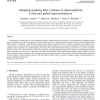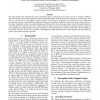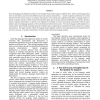56 search results - page 4 / 12 » Quick fmllr for speaker adaptation in speech recognition |
SPEECH
2008
13 years 7 months ago
2008
In this paper we examine the two-way relationship between hyperarticulation and evidence of misrecognition of computer-directed speech. We report the results of an experiment in w...
IJCAI
1997
13 years 8 months ago
1997
Understanding three simultaneous speeches is proposed as a challenge problem to foster artificial intelligence, speech and sound understanding or recognition, and computational au...
INFORMATICALT
2010
13 years 6 months ago
2010
Abstract. New text independent speaker identification method is presented. Phase spectrum of allpole linear prediction (LP) model is used to derive the speech features. The featur...
LREC
2010
13 years 9 months ago
2010
This paper describes the "Alborada-I3A" corpus of disordered speech, acquired during the recent years for the research in different speech technologies for the handicapp...
LREC
2008
13 years 9 months ago
2008
Some big languages like English are spoken by a lot of people whose mother tongues are different from. Their second languages often have not only distinct accent but also differen...



